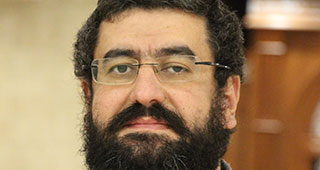The Torah study is dedicatedin the memory of
Asher Ben Haim
3907
2. "The righteous decree and God fulfills"
3. In the Face of Expulsion
Scholars Not Prophets
Many people ask how we should relate to the claim "It will not come to pass!"which was made by great and righteous rabbis before the expulsion and destruction of Gush Katif. To begin with, it should be emphasized that the concept of a "false prophet" only applies to prophecy; there is no concept of a "false scholar." The greatness of a Torah scholar does not depend on his ability to predict the future. The greatness of a Torah scholar depends upon his greatness in Torah, his exemplary character traits, and his devotion to God. There are also some righteous individuals who merit Divine assistance; because of their closeness to God, He fulfills their desires.
When it comes to Torah wisdom and decisions in Torah law, so long as there is no proof that a Torah scholar has overlooked a source, his words are like the words which were said to Moses on Mount Sinai. Even where a scholar overlooks a source, he must be approached and made aware of his error, and he is the only person who can retract the ruling.
"The righteous decree and God fulfills"
In light of this, there are very broad predictions which Torah scholars can make due to their Torah knowledge. However, by and large, such foresight applies not to specifics but to very general matters.
Regarding more specific events, when a scholar states what will happen in the future, he says this either in the sense of a prayer or in the sense of a decree. Not every prayer by a righteous individual is accepted. If a righteous person decrees that something take place in a certain manner - for example, if he states that a certain ill individual will live - the general rule is that "the righteous decree and God fulfills." Though according to Divine decree this person is supposed to be sick, the Almighty usually finds a "bypass road," and governs the world in such a way that the decree of the righteous be fulfilled.
However, sometimes there are unusual circumstances because of which the decree of the righteous must make way for the decree of God. Sometimes the Divine decree comes from such a deep and inner source that even the righteous cannot touch it. When it was decreed by God that Rabbi Akiva must die, all of the angels on high tried to oppose it. However, a Divine voice said, "Be silent! This is my decree, for such has it risen in my thought."
The world of God's thought is lofty and hidden. It is a world to which none has access. The death of Rabbi Akiva revealed a deep and hidden matter to the world, one which emanated from God's thought, from that place which even the heavenly angels cannot reach.
In the Face of Expulsion
And this holds true in our case as well. Generally, when the righteous make a decree, God fulfills it. However, sometimes extraordinary circumstances result in the decree of God overpowering that of the righteous. This is especially true with regard to processes which stem from the most exalted and hidden thought in existence. This sort of Divine decree emanates from a realm so lofty that even a righteous person has no influence.
Regarding instructions given by rabbis to Gush Katif settlers, instructions which appeared to be based upon the idea that "there will be a miracle," let us consider the example of Hananiah. We are told that Hananiah was ready to enter the fiery furnace even though he did not expect a miracle to save him, and in the end a miracle did save him.
This was the intention of those rabbis: devote yourselves on behalf of the sanctification of God's name and this act will itself awaken the miracle.
Most settlement rabbis did not talk about a miracle that was bound to happen. Toward the end, they even gave instructions which were intended to encourage human effort so that people not suffer financial loss. Indeed, on the whole, those who followed such advice were not damaged.
The plight of one who faces expulsion can be likened to that of a person who is mortally ill. Relatives of the sick do all that is in their power to save him. They invest large amounts of money but in the end he dies. Can we say that all of their efforts were a mistake? Certainly not! First of all, one must always leave and opening for the possibility of a miracle. And when it comes to issues such as the redemption of the Jewish people, we must leave more than just an opening - we must leave a large space. This was how the rabbis heartened the settlers of Gush Katif.
Clearly, nobody was obligated to risk the loss of property, and whoever chose to do so did so as a measure of piety. This point was made clear on many occasions. And though those who did choose to follow such a course may in some cases have sustained financial loss, they clearly came out unharmed spiritually and emotionally. They now know that, personally, they did everything that they could and even more. They know that whatever took place did not take place because of a lack of effort on their part but because it was so decreed by God.
Mourning Customs During the Omer
Rabbi Eliezer Melamed | 5764

Chalav Yisrael and Powdered Milk
Rabbi Yirmiyohu Kaganoff | 5772
Pondering Passover
Part 1
Rabbi Eliezer Melamed | Adar 5761









